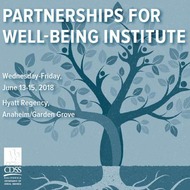C7 What About Dad??
(View Complete Item Description)How are fathers treated in your agency? Child welfare and juvenile probation are required to work with parents of children to create a safe environment for their children. Often; the work is done with the mother; and the efforts to engage the father fade away or are simply less. Does your agency do that? Are the children and youth you work with getting the benefit of their fathers? Is there an unspoken bias to prioritize moms? Hear from dads who have been in the system and are now working hard to make sure agencies are attuned to the needs of fathers. Go dads!
Material Type: Lecture Notes




















